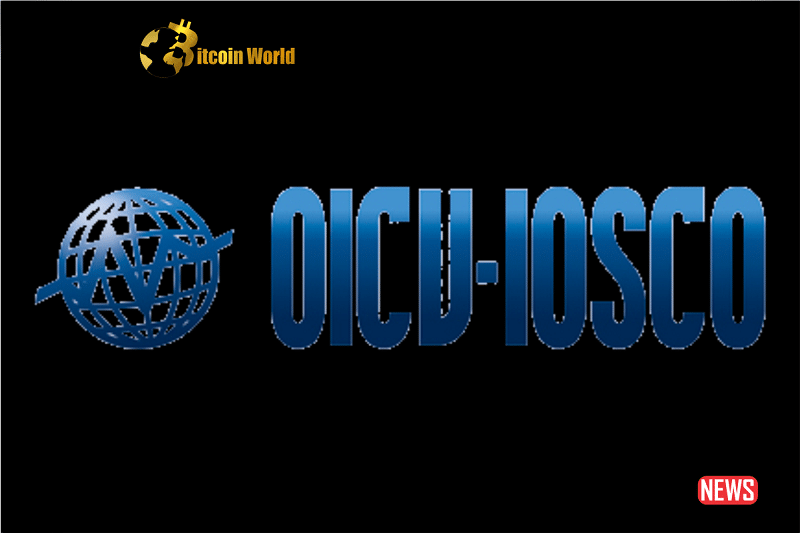Decentralized Finance (DeFi) – it’s been hailed as the future of finance, a wild west of innovation where traditional rules don’t apply, right? But hold on a minute. Global regulators are starting to step into the DeFi arena, and the latest move by the International Organization of Securities Commissions (IOSCO) is a game-changer. Forget the idea that DeFi is some untouchable, decentralized entity floating in cyberspace. IOSCO is saying, loud and clear, that someone is going to be responsible. Let’s dive into what this means for everyone involved in the DeFi world.
Is DeFi Really Decentralized? IOSCO Says ‘Not So Fast!’
For a long time, the DeFi space operated with a sense of regulatory ambiguity. Many believed its decentralized nature made it immune to traditional financial oversight. But IOSCO, a major player in shaping global securities policies, is challenging this very notion. They’re arguing that even in the seemingly decentralized world of DeFi, you can pinpoint “responsible persons.”
Tuang Lee Lim, who chairs IOSCO’s Fintech Task Force, put it plainly: “In reality, regardless of the operating model of the DeFi arrangement, ‘responsible persons’ can be identified.” This statement is a direct shot across the bow to the DeFi community, signaling a significant shift in regulatory thinking.
Why is This Proposal a Big Deal?
Historically, regulators have primarily focused on centralized crypto exchanges like Binance or Coinbase. Think of it like chasing the big fish in the pond. But IOSCO’s new approach is like casting a much wider net. They’re aiming to bring various players within the DeFi ecosystem under regulatory scrutiny. This isn’t just about the big exchanges anymore; it’s about potentially everyone involved in DeFi projects.
Here’s what makes this proposal so noteworthy:
- Shifting Regulatory Focus: Moving beyond centralized entities to encompass the broader DeFi landscape.
- Redefining Decentralization: Challenging the idea that DeFi’s decentralization equates to regulatory immunity.
- Wider Net of Accountability: Potentially impacting a diverse range of individuals and entities within DeFi.
Who Exactly Are These “Responsible Persons”?
IOSCO’s framework casts a wide net when defining “responsible persons.” It’s not just about CEOs or centralized companies. According to their proposal, potential “responsible persons” can include:
- DeFi Project Developers: The individuals and teams who create and launch DeFi protocols.
- DAO Participants: Members of Decentralized Autonomous Organizations who govern DeFi projects.
- Token Holders: Individuals who hold governance tokens and participate in protocol decisions.
- Protocol Advocates: Even those who promote the use of specific DeFi protocols could be considered.
This broad definition is designed to enhance consumer protection, ensuring that there are identifiable points of accountability within the often-complex DeFi ecosystem. But this approach is not without its critics.
The DeFi Community Reacts: Concerns and Challenges
Unsurprisingly, IOSCO’s proposal has sparked significant debate within the DeFi community. While the intention to protect users is understandable, many worry about the practical implications and potential overreach.
Marina Markezic, Executive Director of the European Crypto Initiative, voiced concerns about punishing individuals who might not have malicious intent. Imagine a developer contributing to an open-source DeFi protocol; could they be held liable for unforeseen issues? This is the kind of question being raised.
Erwin Voloder, Head of Policy at the European Blockchain Association, highlighted specific challenges related to Decentralized Autonomous Organizations (DAOs). DAOs are the backbone of governance for many major DeFi projects like Maker, Uniswap, and Aave. But who exactly is the DAO when it comes to accountability?
Challenges with DAO Accountability:
- Defining DAO Membership: Who precisely constitutes the DAO? Is it every token holder? Active participants?
- Liability Concerns: Can a decentralized, fluid group be held legally liable in the same way as a traditional company?
- Enforceability: How can regulations be effectively enforced on DAOs that operate across borders and have no central authority?
Voloder points out that governance tokens in DAOs grant influence similar to shareholders in publicly listed companies. However, the decentralized and often anonymous nature of DAO participants makes traditional regulatory enforcement incredibly difficult.
Navigating Uncharted Waters: The Path Forward for DeFi and Regulation
IOSCO’s proposal is undoubtedly a significant step towards bringing DeFi under a regulatory umbrella. It acknowledges the growing importance of DeFi in the financial landscape and the need for some level of oversight. However, the path ahead is complex and filled with questions.
Key Questions for the Future of DeFi Regulation:
- Balancing Innovation and Accountability: How can regulations protect users without stifling the innovation that drives DeFi?
- Practical Enforceability: How can regulations be effectively enforced in a decentralized and global ecosystem like DeFi?
- Defining “Responsible Persons” Fairly: How can the definition of “responsible persons” be refined to avoid unintended consequences and ensure fairness?
- Global Coordination: How can international bodies like IOSCO facilitate consistent and coordinated DeFi regulations across different jurisdictions?
The conversation between the DeFi community and regulators is just beginning. Finding common ground will be crucial to ensure the continued evolution and security of decentralized finance. It’s about navigating uncharted waters, where the principles of decentralization meet the need for accountability in the financial world. The outcome of these discussions will shape the future of DeFi and its role in the global financial system.
Disclaimer: The information provided is not trading advice, Bitcoinworld.co.in holds no liability for any investments made based on the information provided on this page. We strongly recommend independent research and/or consultation with a qualified professional before making any investment decisions.


